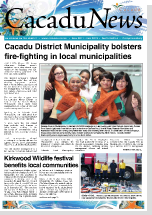Women dominate Nelson Mandela Bay informal sector
According to a new report released by the Eastern Cape Socio Economic Consultative Council (ECSECC) titled, Potential Role of Micro Businesses & Entrepreneurs in the Eastern Cape informal sector, around 65% of the 15 865 informal businesses recorded in the Nelson Mandela Bay Municipality in 2013, are run by women.
While these businesses constitute 13% (or the third highest percentage) of women-run informal businesses in the province, 59% of these enterprises did not survive past three years and only 15% were still in operation after ten or more years.
The Eastern Cape province had the highest number (52.2%) of women involved in the informal sector in the country.
"This could be attributed to demographic issues, migration patterns and also the fact that the province is considered a labour reservoir, where many males leave the province to work in other provinces, especially in the mining sector," the report notes.
The Bay also stood at number four in the province, when it comes to the number of informal businesses, behind the Joe Gqabi district (15 920); OR Tambo district (42 350) and Amathole & Buffalo City Municipality (48 709).
"One would expect 'better access to loans' to be a primary need for informal businesses. However, SESE results show that 7 out of every 10 entrepreneurs engaged in informal businesses do not regard better access to loans as a challenge that could slow their business growth. The need for better access to loans ranged from 16.5% in Nelson Mandela Bay to 40.6% in Chris Hani," the report says.
Main reasons why people decide to start an informal business
About 77% of those surveyed said that unemployment was the reason why they had entered the informal sector in the Nelson Mandela Bay. Around 2% had been retrenched; 3.8% were looking for alternative sources of income; 4% needed to supplement their existing incomes; 6.5% 'liked the activity' and 7% 'had other reasons'.
None of them said they had the skills to succeed in the sector though.
Around 71.4% worked by themselves while the remainder were employers for one or more people.
"[This] latest report shows significant decline in formal employment and increase in informal employment," the ECSECC said.
"The report shows that for every 100 people employed in the Eastern Cape’s formal sector in 1995, there were 14 fewer people in 2013. However, for every 100 people employed in the Eastern Cape’s informal sector in 1995, there were 64 additional people in 2013.
"This implies an employment shift from the formal economy to the informal economy; an inflow into the informal sector in the form of self-employment through the creation of micro-enterprises. This reality cannot be ignored. Given the trend towards increase in informal sector employment, this report emphasises the role that the 148 672 entrepreneurs running informal businesses may play in employment creation."
Net profit
A large proportion (32%) of Eastern Cape entrepreneurs were running informal businesses with a monthly profit level of R0 – R350 which does not pull them out of extreme poverty.
"However, 18% of entrepreneurs have net profits which is above the minimum living level (MLL), hence they fall outside the pool of poor people. In 2013, the MLL for an average family in the Eastern Cape was R2 313," the report says.
Sectors
The informal businesses varied from Retail Trade sector - street traders, “spaza” shops, general dealers including those operating in the fleet market - to the Manufacturing sector - handmade textile and craft, manufacturing of local beverage and local medicine - to the Services sector: auto sector: panel beaters, car wash, auto-mechanics, spray painters, hairdressers, dressmakers, day-care centre, tourism - the Construction sector - artisans and entrepreneurs in construction are: tilers, painters, plumbers, electricians, carpenters, welders, bricklayers - and Agriculture (given the rural nature of the Eastern Cape, both primary and secondary agriculture activities are targeted).
"...of the 148 672 informal businesses in the Eastern Cape, 72 946 operate under 'retail trade not in store'; 16 965 in 'building, construction and civil engineering'; 8 144 in 'other service activities'; and 8 106 in 'other land transport'".
"Irrespective of the industries where they operate, entrepreneurs engaged in informal businesses are better off than those unemployed or discouraged work-seekers who are not in education institutions," the reports adds.
Read the full report here.
Image: NMB tourism
Related Stories
The CEO of a media firm owned by the government connected...
Eastern Cape Police on Friday strongly condemned the attack on two on-duty KwaZakhele SAPS members on Thursday evening, along in Ngwekazi Street in Zwide, Port Elizabeth. "Warrant Officers Ewald Els (40) and Jakobus Botha (42) were following...
Matching “great people with great jobs” has proved a...
There was excitement across social media on Friday afternoon...
East London CBD will soon be welcoming a new and...
The Democratic Alliance (DA) in the Eastern Cape on Friday...
Home, Food & Travel, the Eastern Cape’s leading lifestyle publication, turns thirteen this November...
Eskom has been able to supply the country’s electricity needs and do maintenance without implementing load shedding for the past 26 days, it said on Friday...
Spring month is all about laughter and romance, and Ster-Kinekor...
The National Energy Regulator of South Africa (NERSA) will...
-
 The lingering, unspoken pain of white youth who fought for apartheid
The lingering, unspoken pain of white youth who fought for apartheid
-
 Massive water wastage by ECape's three biggest municipalities, backlogs run into millions
Massive water wastage by ECape's three biggest municipalities, backlogs run into millions
-
 DA convenes public meeting on proposed Thyspunt Nuclear Power station
DA convenes public meeting on proposed Thyspunt Nuclear Power station
-
 Ramaphosa denies knowing jet belonged to Gupta’s
Ramaphosa denies knowing jet belonged to Gupta’s
-
 Sell off the IPTS buses and pay back taxpayers: AfriForum Port Elizabeth
Sell off the IPTS buses and pay back taxpayers: AfriForum Port Elizabeth












